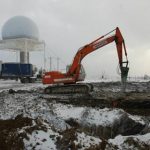Project Info
Location: Kinngait (Cape Dorset), Nunavut
Lead: QBDC, QE
Benefits:
- Pilot project for a region-wide model
- 60% of the project funding stayed in the community in the form of wages, equipment and materials.
Project Description
Nunavut communities are plagued by legacy waste piles that are decades old, filled to capacity and pre-date the current regulatory and management frameworks. The majority of this legacy waste is scrap metal including old fridges, vehicles and building materials.
During QC’s community tours they heard communities are concerned about their dumpsites and need support to improve local solid waste management and infrastructure and to address the waste stockpiles.
In 2017 QBDC secured funding from Polar Knowledge Canada and the Government of Nunavut to conduct a pilot project in Kinngait. The project approach was a collaboration among QC, the Municipality, and the Territorial Government. The intent was to not only clean-up the dumpsite but to also demonstrate the benefits of an Inuit-led and Inuit-delivered project.
The pilot project made clear the benefits of an Inuit-led and Inuit-delivered project. It prioritized local jobs for Inuit and the training and transferrable skills gained through these jobs instilled worker empowerment and community pride.
Fifty-nine percent of the project funding stayed in the community in the form of wages, equipment and materials. One hundred percent of the on-site work was completed by community members who were provided hands-on training and the necessary certifications to complete the work.
The pilot project demonstrated a new funding and delivery model that can be applied to address the metal stockpiles across the Territory. QBDC and QE are currently working with the GN on a regional-wide model to expand the clean-up to all Qikiqtani communities.
For more information contact qbdc@qcorp.ca
For more information:
Metals Bailing in Nunavut
A Community Guide to Backhauling Hazardous Material
A Negotiated Agreement Model




